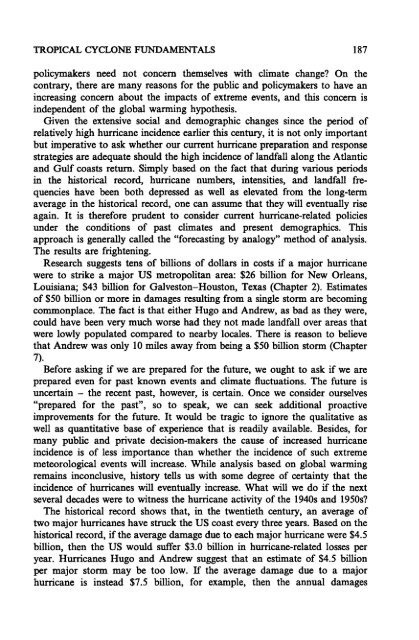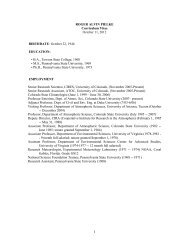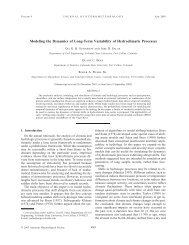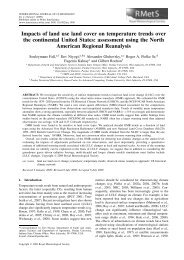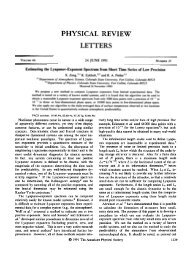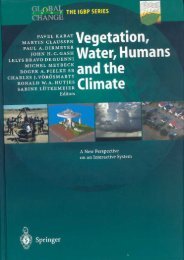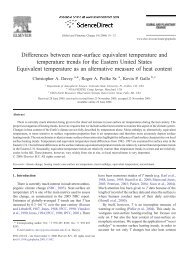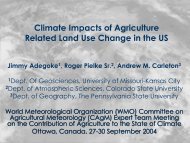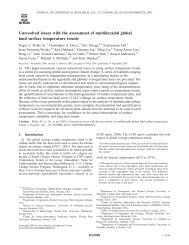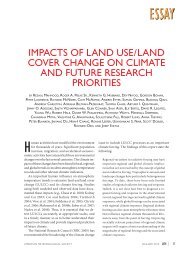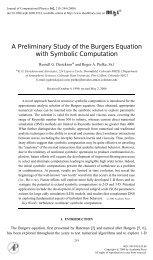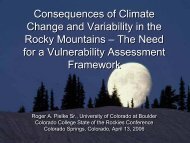Hurricanes: Their Nature and Impacts on Society - Climate Science ...
Hurricanes: Their Nature and Impacts on Society - Climate Science ...
Hurricanes: Their Nature and Impacts on Society - Climate Science ...
Create successful ePaper yourself
Turn your PDF publications into a flip-book with our unique Google optimized e-Paper software.
TROPICAL CYCLONE FUNDAMENTALS 187<br />
policymakers need not c<strong>on</strong>cern themselves with climate change? On the<br />
c<strong>on</strong>trary, there are many reas<strong>on</strong>s for the public <str<strong>on</strong>g>and</str<strong>on</strong>g> policymakers to have an<br />
increasing c<strong>on</strong>cern about the impacts of extreme events, <str<strong>on</strong>g>and</str<strong>on</strong>g> this c<strong>on</strong>cern is<br />
independent of the global warming hypothesis.<br />
Given the extensive social <str<strong>on</strong>g>and</str<strong>on</strong>g> demographic changes since the period of<br />
relatively high hurricane incidence earlier this century, it is not <strong>on</strong>ly important<br />
but imperative to ask whether our current hurricane preparati<strong>on</strong> <str<strong>on</strong>g>and</str<strong>on</strong>g> resp<strong>on</strong>se<br />
strategies are adequate should the high incidence of l<str<strong>on</strong>g>and</str<strong>on</strong>g>fall al<strong>on</strong>g the Atlantic<br />
<str<strong>on</strong>g>and</str<strong>on</strong>g> Gulf coasts return. Simply based <strong>on</strong> the fact that during various periods<br />
in the historical record, hurricane numbers, intensities, <str<strong>on</strong>g>and</str<strong>on</strong>g> l<str<strong>on</strong>g>and</str<strong>on</strong>g>fall frequencies<br />
have been both depressed as well as elevated from the l<strong>on</strong>g-term<br />
average in the historical record, <strong>on</strong>e can assume that they will eventually rise<br />
again. It is therefore prudent to c<strong>on</strong>sider current hurricane-related policies<br />
under the c<strong>on</strong>diti<strong>on</strong>s of past climates <str<strong>on</strong>g>and</str<strong>on</strong>g> present demographics. This<br />
approach is generally called the "forecasting by analogy" method of analysis.<br />
The results are frightening.<br />
Research suggests tens of billi<strong>on</strong>s of dollars in costs if a major hurricane<br />
were to strike a major US metropolitan area: $26 billi<strong>on</strong> for New Orleans,<br />
Louisiana; $43 billi<strong>on</strong> for Galvest<strong>on</strong>-Houst<strong>on</strong>, Texas (Chapter 2). Estimates<br />
of $50 billi<strong>on</strong> or more in damages resulting from a single storm are becoming<br />
comm<strong>on</strong>place. The fact is that either Hugo <str<strong>on</strong>g>and</str<strong>on</strong>g> Andrew, as bad as they were,<br />
could have been very much worse had they not made l<str<strong>on</strong>g>and</str<strong>on</strong>g>fall over areas that<br />
were lowly populated compared to nearby locales. There is reas<strong>on</strong> to believe<br />
that Andrew was <strong>on</strong>ly 10 miles away from being a $50 billi<strong>on</strong> storm (Chapter<br />
7). Before asking if we are prepared for the future, we ought to ask if we are<br />
prepared even for past known events <str<strong>on</strong>g>and</str<strong>on</strong>g> climate fluctuati<strong>on</strong>s. The future is<br />
uncertain -the recent past, however, is certain. Once we c<strong>on</strong>sider ourselves<br />
"prepared for the past", so to speak, we can seek additi<strong>on</strong>al proactive<br />
improvements for the future. It would be tragic to ignore the qualitative as<br />
well as quantitative base of experience that is readily available. Besides, for<br />
many public <str<strong>on</strong>g>and</str<strong>on</strong>g> private decisi<strong>on</strong>-makers the cause of increased hurricane<br />
incidence is of less importance than whether the incidence of such extreme<br />
meteorological events will increase. While analysis based <strong>on</strong> global warming<br />
remains inc<strong>on</strong>clusive, history tells us with some degree of certainty that the<br />
incidence of hurricanes will eventually increase. What will we do if the next<br />
several decades were to witness the hurricane activity of the 1940s <str<strong>on</strong>g>and</str<strong>on</strong>g> 1950s?<br />
The historical record shows that, in the twentieth century, an average of<br />
two major hurricanes have struck the US coast every three years. Based <strong>on</strong> the<br />
historical record, if the average damage due to each major hurricane were $4.5<br />
billi<strong>on</strong>, then the US would suffer $3.0 billi<strong>on</strong> in hurricane-related losses per<br />
year. <str<strong>on</strong>g>Hurricanes</str<strong>on</strong>g> Hugo <str<strong>on</strong>g>and</str<strong>on</strong>g> Andrew suggest that an estimate of $4.5 billi<strong>on</strong><br />
per major storm may be too low. If the average damage due to a major<br />
hurricane is instead $7.5 billi<strong>on</strong>, for example, then the annual damages


